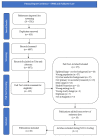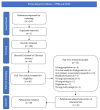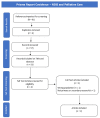NDIS Participants with Psychosocial Disabilities and Life-Limiting Diagnoses: A Scoping Review
- PMID: 36011776
- PMCID: PMC9407781
- DOI: 10.3390/ijerph191610144
NDIS Participants with Psychosocial Disabilities and Life-Limiting Diagnoses: A Scoping Review
Abstract
This research aimed to map evidence about system supports and gaps for Australians with psychosocial disabilities and life-limiting diagnoses. A scoping review of available policy documents, academic, and grey literature was completed to discover key characteristics of this concept and provide context around the phenomenon. Our focus was on Australia's National Disability Insurance Scheme (NDIS), a key reform providing support to the disability population nationally. No peer-reviewed or grey literature was retrieved on the phenomena. Therefore, three lines of enquiry were developed: experiences of NDIS participants living with psychosocial disabilities; the death, dying, and palliative care supports and experiences of NDIS participants of any disability type; and the experiences for people living with severe and persistent mental illness (SPMI) and life-limiting diagnoses. Five themes were identified: (1) the person; (2) advocacy; (3) informal supports; (4) formal supports; and (5) existing research. NDIS participants living with SPMI and their informal and formal support systems are still struggling to navigate the NDIS. While there are no specific publications about their end-of-life experiences, people with SPMI often experience poor end-of-life outcomes. Rigorous research into their death, dying, and palliative care experiences is needed to inform improved support to them, including their end-of-life care.
Keywords: National Disability Insurance Scheme (NDIS); life-limiting; palliative care; psychosocial disability; severe and persistent mental illness.
Conflict of interest statement
The authors declare no conflict of interest.
Figures
References
-
- Tune D. Review of The National Disability Insurance Scheme Act 2013: Removing Red Tape and Implementing the NDIS Participant Service Guarantee. Department of Social Services; Canberra, Australia: 2019.
-
- Council of Australian Governments . Principles to Determine the Responsibilities of the NDIS and Other Service Systems. Council of Australian Governments; Canberra, Australia: 2015.
-
- NDIS Scheme Actuary . NDIS Annual Financial Sustainability Report 2020–2021. National Disability Insurance Agency, Australian Government; Geelong, Australia: 2021. p. 125.
Publication types
MeSH terms
LinkOut - more resources
Full Text Sources
Medical





